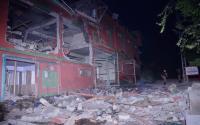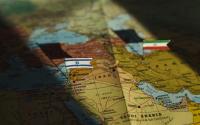Kamal Ahmed in London and Ed Vulliamy in WashingtonSunday January 12, 2003
On the second floor of the United Nations headquarters building in New York is a drab briefing room with two chairs at the front. It is the venue for 'closed door consultations' between the UN's Iraq weapons inspectors and the 15 members of the Security Council, including Britain and the United States.
Last Thursday at 10.45am, Hans Blix, executive chairman of the inspection team, settled into one of the chairs and called the meeting to order. Before him were 15 ambassadors, including Sir Jeremy Greenstock of Britain and John Negroponte of the US. The atmosphere was tense.
The occasion was Blix's first interim report into whether Saddam Hussein has been complying with UN resolution 1441 calling on him to allow unfettered access to inspectors searching for weapons of mass destruction.
If the hawks thought this was to be the moment when Saddam would finally break the trip wire and that military action would follow they were to be disappointed.
'Evidently if we had found any "smoking gun" we would have reported it to the council,' Blix said. 'Similarly, if we had met a denial of access or other impediment to our inspections we would have reported it to the council. We have not submitted any such reports.'
It seemed an open and shut case. Blix had not found any evidence of weapons of mass destruction. And neither had he been frustrated by Iraqi efforts during the inspections. Military action, it appeared, was a receding possibility. Over the last seven days it has appeared as if peace is breaking out all over the place. Tony Blair said that it was time for a patient approach to the issue of Saddam. Jack Straw, the Foreign Secretary, said that the chances for war were now 60:40 against rather than the 60:40 for that had been supposed just before Christmas.
Colin Powell, US Secretary of State, made similar comments. 'The odds have gone down for war,' one US official told the Washington Post. 'We don't have a good war plan; the inspectors have unprecedented access to Iraq; we have just started giving them intelligence; we have to give them more time to see how this works. There is no reason to stop the process until it can't proceed any further.'
Around the world the atmosphere was cooling. In Germany, where Blair arrived for a dinner with Chancellor Gerhard Schröder last night, diplomats were making their opposition to military action clear. 'We subscribe to the recent statement of the [UN] Secretary-General that the inspections should continue and for that reason there are no grounds for military action,' said Günter Pleuger, German Ambassador to the UN, who will take over as chairman of the Security Council next month.
Turkey, a 'front-line state' if any military action is taken against Iraq, has also made clear its opposition to any unilateral action by the US or Britain without UN sanction. Saudi Arabia, Syria and Egypt also have grave misgivings
Blix went further. His interim report on Saddam and chemical and biological weapons, due on 27 January, was not a 'deadline' but merely an 'update' on what one UN official called an 'ongoing process'. In America there is now talk of 'slippage' in any military timetable. Blix's next summary of Iraq's weapons will now not be until 1 March.
All the events seemed to point in one direction. The appearance is that Saddam is starting to wriggle off the hook; that the world has started to wobble. But, speaking to officials closely involved in the military build-up for possible military action in the Gulf, appearances can be deceptive.
At lunchtime yesterday, HMS Ark Royal set sail from Portsmouth for the Gulf. The message was not lost on those watching: here is a country preparing for conflict.
In what will be the biggest military deployment since the Falklands conflict, the Ark Royal will spearhead a force of 5,000 naval personnel and 3,000 Marines. Ostensibly it is there for an exercise in the region, long planned. But appearances can be deceptive.
The inclusion of HMS Ocean and her amphibious escorts in the Ark Royal fleet, and the conversion of the Ark Royal effectively from an aircraft carrier to a helicopter carrier points to an amphibious operation. There is only one reason for those changes: an attack on Iraq.
'What we need to do is produce a credible force to influence Saddam's decision-making,' said Admiral David Snelson, asked by the al-Jazeera Arabic television station if he had a message for the Iraqi President. 'I think it was Kofi Annan [the UN Secretary-General] who said "where diplomacy works, diplomacy works a lot better when it is backed up by force".'
Officials in Downing Street and the Ministry of Defence said that people had 'got the wrong end of the stick' over Blix's comments and Blair's statements on the need for patience. Although one official said that the week had been marked by 'cock-up and confusion' over the central message on possible military action, he said it was clear which way the wind was blowing.
'We know he has got weapons of mass destruction,' said one well-placed No 10 source. 'If Blix finds anything, then that will be a breach of the resolution; if Blix's work is frustrated, then that will also be a breach.
'Saddam has to actually disarm or we take action. The last few days has seen a concerted effort to say that 27 January was not D-Day. Some people have engaged in wishful thinking about what that actually means. But we are still clear where we are going.'
Sources admit that the public have been left confused. On the one hand Geoff Hoon, the Secretary of State for Defence, announces the deployment of troops and the calling up of reservists. On the other Straw says that a non-military response to Saddam is now more likely. When Hoon was asked about Straw's comments, he said that they had been 'unhelpful'.
'We have a clear objectives document which is made up of three strands,' the Downing Street official said. 'First, support for the UN and UNMovic [the inspection team]; second, a credible military build-up, should military action be necessary; and third, a move forward on the Middle East peace process. Now, clearly Jack is going to speak more to the first of those strands while Geoff is going to more aligned to the second.'
The Government is convinced that, far from being a doveish response, Blix was far tougher than was reported. The full minute of his opening statement last Thursday reveals growing frustration at the way Saddam is operating.
'Iraqi officials have sought to construe the prompt access which has been given to inspection teams and the fact that no weapons of mass destruction have been found as confirmation of their assertion that there are no weapons of mass destruction,' Blix said. 'The matter is, of course, not that simple.
'The absence of "smoking guns" is no guarantee that prohibited stocks or activities could not exist at other sites, whether above ground, underground or in mobile units.'
Blix was joined in the briefing by Mohamed ElBaradei, head of the International Atomic Energy Agency. ElBaradei said that Iraqi attempts to buy aluminium tubes were 'consistent' with rocket manufacture rather than a nuclear programme, again seeming to pour cold water on chances of a conflict.
But still the oil price rose on the day of his comments as the markets felt war was more likely. Why? Because ElBaradei also said that Saddam had failed to provide the 'pro-active co-operation we expect'. The demands on Saddam are growing.
UN sources said that, at the end of the meeting, British and US officials made it clear Saddam had to engage in pro-active co-operation 'or else'. Or else what? Or else military action is 'inevitable', said one official. There is now more confidence among US and British officials that the UN will provide the trigger, obviating the need for unilateral action.
'We are aware that this is an extremely difficult argument but, at its most basic, is the UN going to do something about a man who consistently flouts UN resolutions or is it going to become a nouveau League of Nations?', said one government official.
This week will see a significant ratcheting up of the UN pressure on Saddam. High-level air reconnaissance flights will begin over Iraq, joining the helicopter fleet which arrived in the region last week. Blix, after visiting London, Paris and Brussels to discuss intelligence swaps, will make his first visit to Baghdad since the inspections began.
The US administration had swung behind Powell, insisting that the passage to war must proceed through the UN.
But in recent days those who speak for the Pentagon - markedly former Deputy Secretary of Defence, Richard Perle, now a powerful influence from outside the administration - have insisted that the inspectorate process with which they have been so impatient need not prevent the US from going to war, whatever it produces. Pentagon officials echo what is said to be Defence Secretary Donald Rumsfeld's view that there is no stopping the US pursuing its interests, however it sees fit.
The number three at the State Department, John Bolton, even said: 'There is no such thing as the United Nations. There is only the international community, which can only be led by the only remaining superpower, which is the United States.'
Rumsfeld himself is reported to see Iraq as the test case for his new 'pro-active' view of how the Pentagon should be reshaped and how America should mould the planet to its chosen order.
Even the smallest signals are pointing in one direction. In Cyprus, where UN weapons inspectors have set up their main field office, the authorities are bracing for war. 'Yes, I think it will happen,' said the island's Foreign Minister, Ioannis Cassoulides. 'They [the US and Britain] seem pretty determined.'
Asked what his personal feeling was about the possibility of military action against Saddam, one British government official said that 'it was still more likely than not'.
The focus will now be on Blix and his next report. If that doesn't produce the material breach, then another report will be provided on 1 March. If there is still room for manoeuvre, then Blix will report again during the summer. Each will be a possible trigger.






